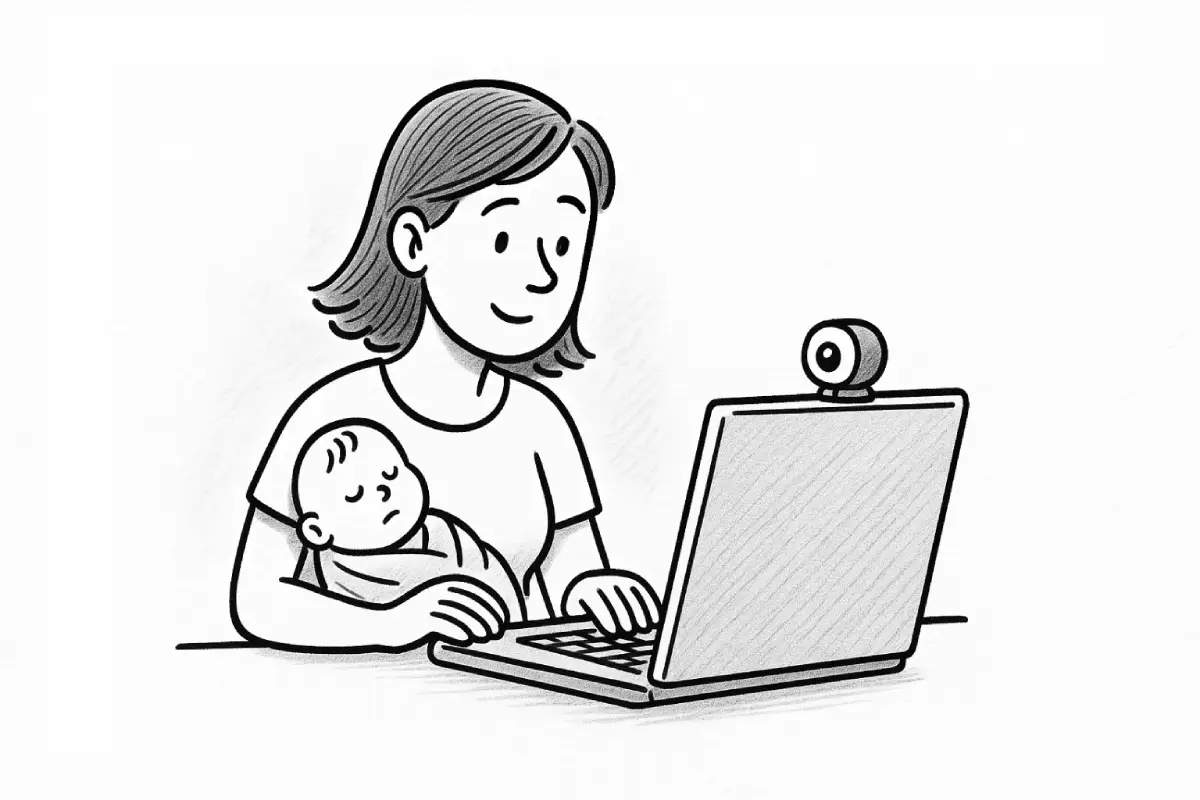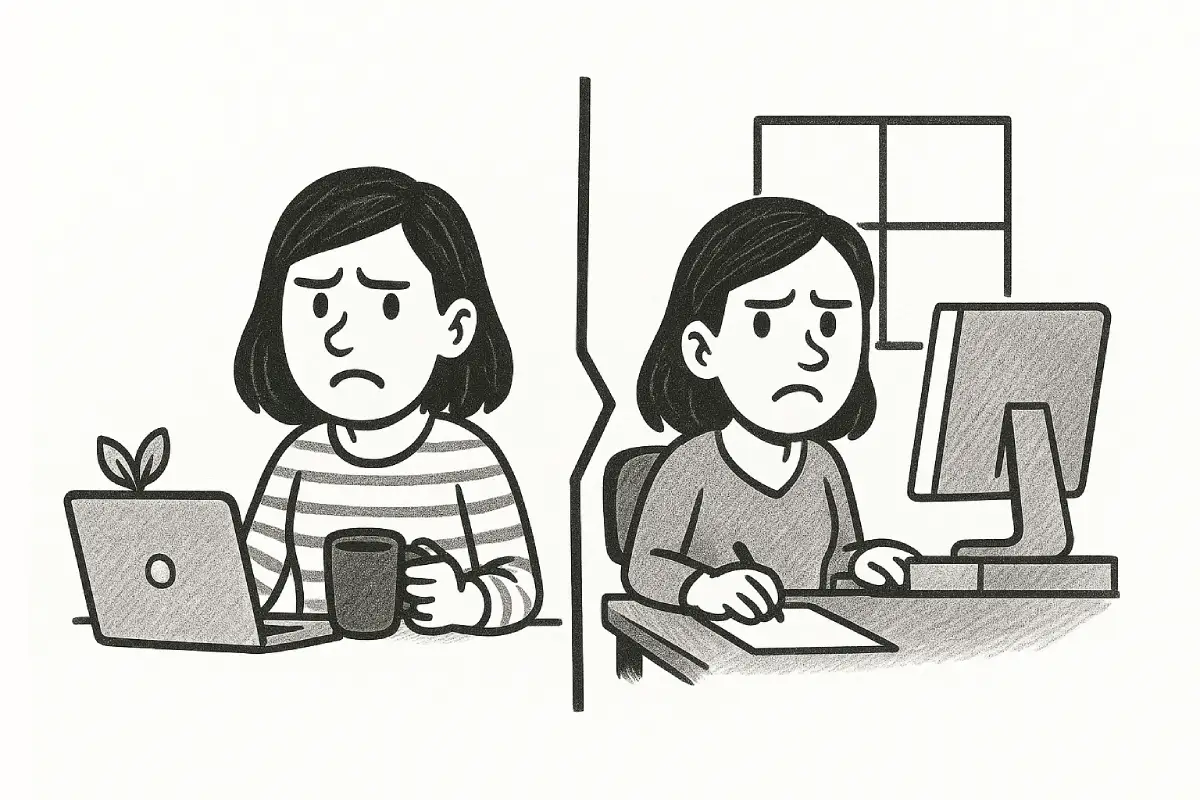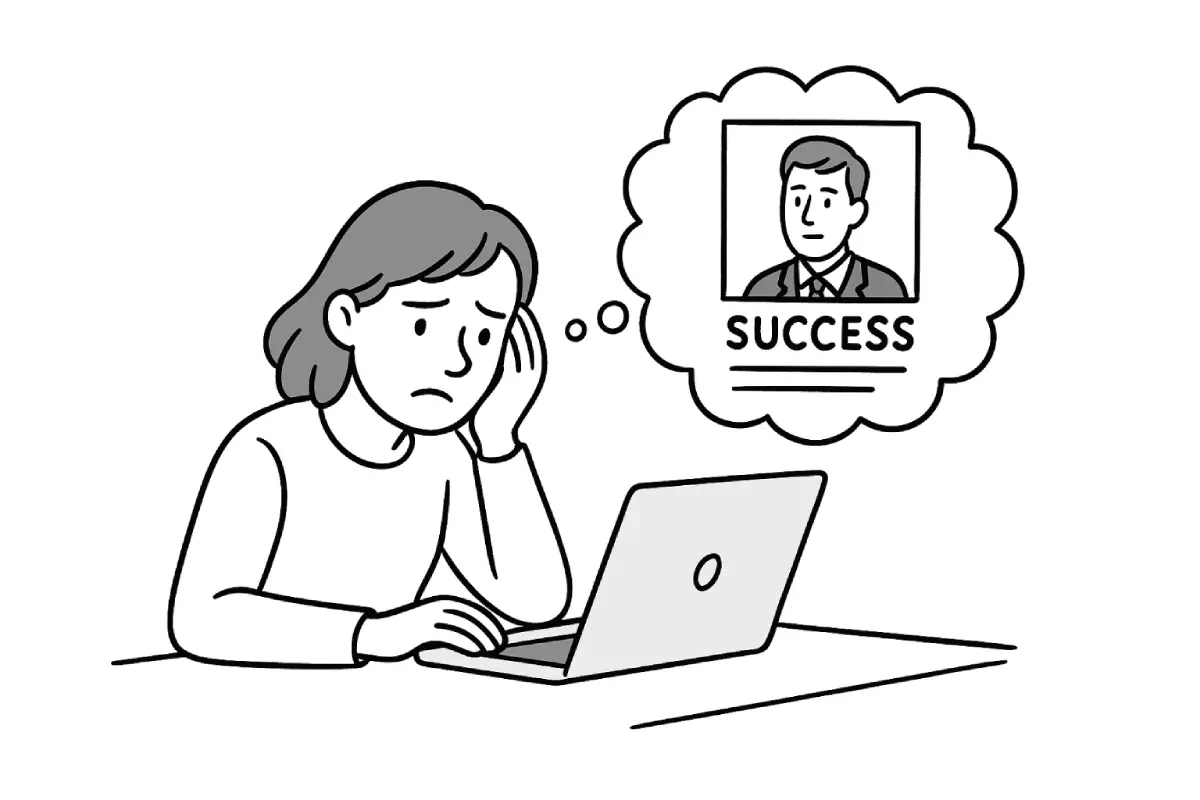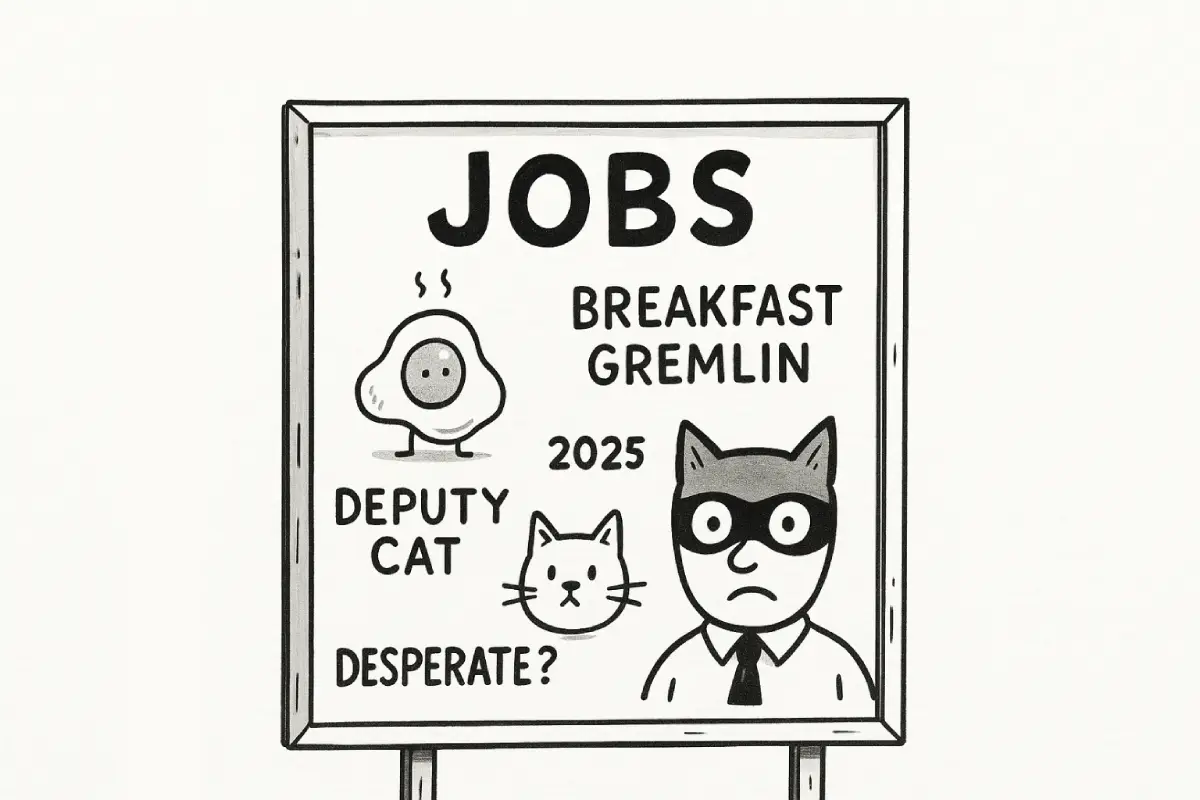Ania is a 38-year-old from Poland with a degree in hospitality management.
It all starts with the coffee.
Before, the coffee was a necessity born of desperation. A bitter, sludgy thing gulped down under the buzzing fluorescent lights of a hotel back office in Kraków, a city that had suddenly decided it didn’t need her anymore. That coffee tasted of panic. Of spreadsheets that didn’t add up and a manager who watched the clock. Always the clock. Now, the coffee is a ritual. It’s a French press, a gift to herself, and it steams gently next to a laptop that connects her not to the dreary office five kilometers away, but to a buzzing startup somewhere in Austin, Texas.
The difference is everything.
Ania — 38, sharp-witted, with a laugh that seems to apologize for itself before it even begins—is a Virtual Assistant. A year ago, she wouldn’t have known what that meant. A year ago, she was, in her own words, “drowning.”
“You know that feeling when you’re swimming, and you’re good at it, you’ve always been good at it, and then suddenly you just can’t remember how to kick? Your arms are lead. The shore is right there, but it might as well be the moon. That was me. Every single day. For months.”
Her story isn’t unique, not really. That’s the tragedy of it. A degree in hospitality management, a decade climbing the ladder to a respectable position at a boutique hotel. It was a solid life. A predictable life. Then 2020 happened, and the whole house of cards just… folded. Tourists vanished. The hotel cut staff. Her “respectable position” evaporated into a puff of polite, corporate-speak smoke. She was left with a nine-year-old son, Jakub, a mortgage, and a skillset that the world had abruptly deemed non-essential.
The Great, Terrifying Silence
The months that followed were a hodgepodge of cobbled-together gigs. A bit of translation work here (her English was always good), a disastrous attempt at selling artisanal cheese at a local market there. It was a frantic, undignified scramble. The savings dwindled. The quiet anxiety of the morning became a roaring cacophony by nightfall.
She spent her evenings, after Jakub was asleep, bathed in the blue light of her phone. Scrolling. Endlessly scrolling through job sites. The Polish ones were a wasteland of low-paying service jobs she couldn’t take or corporate roles demanding five years of recent, relevant experience in fields she’d never touched. It was a special kind of hell. Applying for jobs you know you won’t get, just to feel like you’re doing something. Anything.
“I felt like a ghost. I was applying for things I was overqualified for, and they wouldn’t have me because they knew I’d leave. Then I’d apply for things I was perfectly qualified for, but they’d say I had a ‘gap’ in my resume. The gap! The gap was them firing me! It was madness. A completely circular, insane logic.”
It was on one of those nights, probably around 2 AM, fueled by cheap wine and cheaper despair, that she stumbled onto something different. Jobicy. The name was weird. The interface was clean, minimalist. And the jobs… they weren’t in Kraków. They weren’t even in Poland. They were everywhere. Remote. A word that, for her, had always meant a television controller.
“Honestly, I thought it was a scam at first,” she admits, pulling a face. “It looked too… simple. Too good to be true. All these companies in America, in the UK, looking for people. Why would they look here? Why would they look at me?”
But desperation is a powerful motivator. It overrides skepticism. She typed “assistant” into the search bar. Not “hotel manager.” Not “hospitality professional.” Just the base skill. The thing she was good at: organizing, communicating, making things run smoothly.
She sent out five applications that night. Just five. But for the first time in months, it didn’t feel like screaming into the void. “With most Polish sites, you’d never hear back. Nothing. Ghost town. But on Jobicy, I got a response in 48 hours. That was the first sign that maybe this wasn’t a dead end.”
A listing popped up. “Remote Executive Assistant – US Startup.” The description was a world away from the stiff, formal listings she was used to. It talked about a “fast-paced environment,” “wearing multiple hats,” and a “can-do attitude.” It didn’t ask for a degree in computer science. It didn’t mention needing to know how to code. It asked for someone organized. A problem-solver. Someone who wasn’t afraid to learn.
It felt like a message in a bottle.
The Interview That Wasn’t an Interrogation
So she applied. She hammered out a cover letter, a raw, honest thing that ditched the professional jargon and just told her story. She talked about managing chaotic check-in days with demanding clients. She drew a parallel between juggling suppliers for a hotel restaurant and managing a CEO’s calendar. It was a long shot. A Hail Mary pass across the Atlantic.
She didn’t expect a reply. She got one two days later.
The interview was a video call. Ania, sitting at her kitchen table, trying to make sure the lighting didn’t show the faint water stain on the ceiling. On the other side of the screen was a woman named Sarah, the startup’s COO. She was maybe thirty, wearing a hoodie, and drinking from a mug the size of a small bucket. There was no HR checklist. No trick questions. It was a conversation.
“It was the strangest and best interview of my life. She didn’t ask me to ‘describe my biggest weakness.’ God, I hate that question. Instead, she asked me what I did when a guest was screaming at me because their room wasn’t ready. She asked me how I would handle three different ‘urgent’ tasks landing on my desk at the same time. They were real questions. About real work.”
Ania, used to the rigid formality of the Polish corporate world, was thrown off balance. But in a good way. She found herself relaxing. She told the story of the time the hotel’s plumbing burst during a wedding reception and how she’d managed to calm a hysterical bride while secretly coordinating with plumbers in the basement. She talked. Just talked. For an hour.
What helped her pass? I think it was that she didn’t pretend to be something she wasn’t. She owned her lack of tech experience. “I told her, straight up, ‘I’ve never used Slack. I don’t know what Asana is. But I learn fast. Show me once, and I’ll be an expert by the end of the day.’ I think… I think she liked that.”
It’s a classic startup mentality, really. They don’t always hire for the resume; they hire for the aptitude. For the hunger. They saw in a laid-off Polish hotel manager the one thing you can’t teach: resilience. The grit of someone who knows how to handle a crisis without a playbook.
She got the job.
She later learned that over 200 people had applied. Sarah told her it wasn’t the resume that stood out — it was the tone. The raw honesty. “You didn’t pretend,” she said. “You just sounded like someone who would figure it out no matter what.”
A New Kind of Clock
Life looks different now. Radically different. The frantic energy is gone, replaced by a focused calm. Her workday starts not with a stressful commute, but with walking Jakub to school. She holds his hand. They talk. A small luxury that feels like the greatest treasure in the world.
Her “office” is a corner of her living room. The work itself was a steep learning curve, a blur of new apps and new jargon. But she was right. She learned fast. Her days are a flurry of scheduling meetings across time zones, managing expense reports, researching travel options, and generally being the organizational backbone for a team of people she’s never met in person. It’s demanding. It’s challenging. But it’s not soul-crushing.
The clock is still there, of course. But it’s a different kind of clock. It’s the six-hour time difference between Kraków and Austin. It’s the deadline for a presentation deck. It’s a clock she controls, not one that controls her.
“The money… yes, the money is better. Much better. It’s life-changing, of course. I paid off my debts. I can buy Jakub the good sneakers, not the cheap ones that fall apart. But it’s not just that. It’s the respect. It’s the feeling of being trusted. My boss—Sarah—she doesn’t care if I take two hours off in the middle of the day to go to my son’s school play. As long as the work gets done. That freedom… you cannot put a price on it. It’s the air I breathe now.”
Her starting salary was nearly double what she’d earned in her last hotel job. In just six months, she built enough confidence to start a small side business offering virtual admin support to solopreneurs. “It’s funny,” she says, “for years I thought I had to beg for jobs. Now people are pitching me.”
This isn’t some fairy tale. It’s not a story about “making it” in the traditional sense. It’s a story about adaptation. About the quiet, seismic shifts happening in the world of work, where geography is becoming an afterthought and skills are being re-evaluated. Ania didn’t get a new degree. She didn’t retrain as a software developer. She just found a place where her existing talents—her grace under pressure, her organizational genius, her fundamental decency—were valued.
She found a bridge from a world that had shut her out to one that was wide open. It just happened to be a digital one. And it all started with a desperate, late-night search that led her, improbably, to a job board and a startup an ocean away.
Would she recommend Jobicy to others like her? She doesn’t hesitate.
“God, yes. But don’t fake it. Don’t try to be techie if you’re not. Show them how your skills apply. Show them who you are. There’s a company out there that doesn’t care where you live. They just need someone who gives a damn.”
Sometimes, the shore you’ve been flailing towards isn’t the one you thought you needed. Sometimes, it’s a whole new continent. And all you needed was a Wi-Fi signal to see it.
You might also like: The Jobs Most Likely to Disappear by 2035









